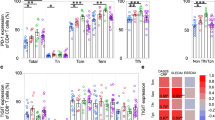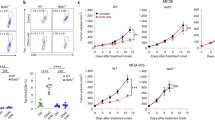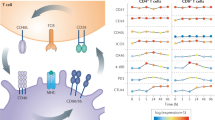Abstract
The use of agonistic monoclonal antibody against CD40 has emerged as one the most effective ways to boost immune responses against infectious agents or to fight cancer. Here, we report that the same monoclonal antibodies against CD40 (FGK45 and 3/23) previously used to elicit protective immune responses treated the autoimmune inflammatory process of chronic collagen-induced arthritis in DBA/1–TCR-β transgenic mice, as well as collagen-induced arthritis in DBA/1 mice, both animal models of rheumatoid arthritis. This study indicates that agonistic monoclonal antibody against CD40 can potentially be used to treat chronic autoimmune inflammatory processes.
This is a preview of subscription content, access via your institution
Access options
Subscribe to this journal
Receive 12 print issues and online access
$209.00 per year
only $17.42 per issue
Buy this article
- Purchase on Springer Link
- Instant access to full article PDF
Prices may be subject to local taxes which are calculated during checkout






Similar content being viewed by others
References
Bluestone, J.A. New perspectives of CD28-B7-mediated T cell costimulation. Immunity 2, 555–559 ( 1995).
Lenschow, D.J. et al. Long-term survival of xenogeneic pancreatic islet grafts induced by CTLA4lg. Science 257, 789– 792 (1992).
Lin, H. et al. Long-term acceptance of major histocompatibility complex mismatched cardiac allografts induced by CTLA4Ig plus donor-specific transfusion. J. Exp. Med. 178, 1801–1806 (1993).
Maiuri, L. et al. Blockage of T-cell costimulation inhibits T-cell action in celiac disease. Gastroenterology 115, 564– 572 (1998).
Guinan, E.C. et al. Transplantation of anergic histoincompatible bone marrow allografts . N. Engl. J. Med. 340, 1704– 1714 (1999).
Grewal, I.S. & Flavell, R.A. CD40 and CD154 in cell-mediated immunity. Annu. Rev. Immunol. 16, 111– 135 (1998).
Durie, F.H. et al. Prevention of collagen-induced arthritis with an antibody to gp39, the ligand for CD40. Science 261, 1328–1330 (1993).
Mohan, C., Shi, Y., Laman, J.D. & Datta, S.K. Interaction between CD40 and its ligand gp39 in the development of murine lupus nephritis. J. Immunol. 154, 1470–1480 (1995).
Griggs, N.D. et al. The relative contribution of the CD28 and gp39 costimulatory pathways in the clonal expansion and pathogenic acquisition of self-reactive T cells. J. Exp. Med. 183, 801– 810 (1996).
Balasa, B. et al. CD40 ligand-CD40 interactions are necessary for the initiation of insulitis and diabetes in nonobese diabetic mice. J. Immunol. 159, 4620–4627 ( 1997).
Howard, L.M. et al. Mechanisms of immunotherapeutic intervention by anti-CD40L (CD154) antibody in an animal model of multiple sclerosis. J. Clin. Invest. 103, 281–290 ( 1999).
Kirk, A.D. et al. Treatment with humanized monoclonal antibody against CD154 prevents acute renal allograft rejection in nonhuman primates. Nature Med. 5, 686–693 ( 1999).
Dullforce, P., Sutton, D.C. & Heath, A.W. Enhancement of T cell-independent immune responses in vivo by CD40 antibodies. Nature Med. 4, 88–91 (1998).
French, R.R., Chan, H.T., Tutt, A.L. & Glennie, M.J. CD40 antibody evokes a cytotoxic T-cell response that eradicates lymphoma and bypasses T-cell help. Nature Med. 5, 548– 553 (1999).
Diehl, L. et al. CD40 activation in vivo overcomes peptide-induced peripheral cytotoxic T-lymphocyte tolerance and augments anti-tumor vaccine efficacy . Nature Med. 5, 774–779 (1999).
Sotomayor, E.M. et al. Conversion of tumor-specific CD4+ T-cell tolerance to T-cell priming through in vivo ligation of CD40. Nature Med. 5, 780–787 ( 1999).
Mauri, C., Chu, C.Q., Woodrow, D., Mori, L. & Londei, M. Treatment of a newly established transgenic model of chronic arthritis with nondepleting anti-CD4 monoclonal antibody. J. Immunol. 159, 5032–5041 ( 1997).
Maxwell, J.R., Campbell, J.D., Kim, C.H. & Vella, A.T. CD40 activation boosts T cell immunity in vivo by enhancing T cell clonal expansion and delaying peripheral T cell deletion. J. Immunol. 162, 2024–2034 ( 1999).
Mauri, C., Williams, R.O., Walmsley, M. & Feldmann, M. Relationship between Th1/Th2 cytokine patterns and the arthritogenic response in collagen-induced arthritis. Eur. J. Immunol. 26, 1511–1158 (1996).
Chu, C.Q. & Londei, M. Induction of Th2 cytokines and control of collagen-induced arthritis by nondepleting anti-CD4 Abs. J. Immunol. 157, 2685–2689 (1996).
Liblau, R.S., Singer, S.M. & McDevitt, H.O. Th1 and Th2 CD4+ T cells in the pathogenesis of organ-specific autoimmune diseases. Immunol. Today 16, 34–38 (1995).
Abbas, A.K., Murphy, K.M. & Sher, A. Functional diversity of helper T lymphocytes. Nature 383, 787–793 ( 1996).
de Vries, J.E. Immunosuppressive and anti-inflammatory properties of interleukin 10. Ann. Med. 27, 537–541 ( 1995).
Walmsley, M. et al. Interleukin-10 inhibition of the progression of established collagen-induced arthritis. Arthritis Rheum. 39, 495–503 (1996).
Hogaboam, C.M. et al. Therapeutic effects of interleukin-4 gene transfer in experimental inflammatory bowel disease. J. Clin. Invest. 100, 2766–2776 (1997).
Lanzavecchia, A. Antigen-specific interaction between T and B cells. Nature 314, 537–539 (1985).
Finkelman, F.D. et al. Production of BSF-1 during an in vivo, T-dependent immune response. J. Immunol. 137, 2878– 2885 (1986).
Finkelman, F.D., Snapper, C.M., Mountz, J.D. & Katona, I.M. Polyclonal activation of the murine immune system by a goat antibody to mouse IgD. IX. Induction of a polyclonal IgE response. J. Immunol. 138, 2826–2830 (1987).
Gajewski, T.F., Pinnas, M., Wong, T. & Fitch, F.W. Murine Th1 and Th2 clones proliferate optimally in response to distinct antigen-presenting cell populations. J. Immunol. 146, 1750– 1758 (1991).
Matzinger, P. Tolerance, danger, and the extended family. Annu. Rev. Immunol. 12, 991–1045 ( 1994).
Cella, M., Sallusto, F. & Lanzavecchia, A. Origin, maturation and antigen presenting function of dendritic cells. Curr. Opin. Immunol. 9, 10–16 (1997).
Powrie, F., Menon, S. & Coffman, R.L. Interleukin-4 and interleukin-10 synergize to inhibit cell-mediated immunity in vivo. Eur. J. Immunol. 23, 3043–3049 (1993).
Sadick, M.D. et al. Cure of murine leishmaniasis with anti-interleukin 4 monoclonal antibody. Evidence for a T cell-dependent, interferon gamma-independent mechanism . J. Exp. Med. 171, 115– 127 (1990).
Fiorentino, D.F., Bond, M.W. & Mosmann, T.R. Two types of mouse T helper cell. IV. Th2 clones secrete a factor that inhibits cytokine production by Th1 clones. J. Exp. Med. 170, 2081–2095 ( 1989).
Day, M.J., Tse, A.G., Puklavec, M., Simmonds, S.J. & Mason, D.W. Targeting autoantigen to B cells prevents the induction of a cell- mediated autoimmune disease in rats. J. Exp. Med. 175, 655–659 (1992).
Saoudi, A., Simmonds, S., Huitinga, I. & Mason, D. Prevention of experimental allergic encephalomyelitis in rats by targeting autoantigen to B cells: Evidence that the protective mechanism depends on changes in the cytokine response and migratory properties of the autoantigen-specific T cells. J. Exp. Med. 182, 335– 344 (1995).
Faassen, A.E., Dalke, D.P., Berton, M.T., Warren, W.D. & Pierce, S.K. CD40-CD40 ligand interactions stimulate B cell antigen processing. Eur. J. Immunol. 25, 3249–3255 (1995).
Macaulay, A.E., DeKruyff, R.H., Goodnow, C.C. & Umetsu, D.T. A ntigen-specific B cells preferentially induce CD4+ T cells to produce IL-4. J. Immunol. 158, 4171– 4179 (1997).
Skok, J., Poudrier, J. & Gray, D. Dendritic cell-derived IL-12 promotes B cell induction of Th2 differentiation: A feedback regulation of Th1 development. J. Immunol. 163, 4284–4291 (1999).
Ferlin, W.G. et al. The induction of a protective response in Leishmania major-infected BALB/c mice with anti-CD40 mAb. Eur. J. Immunol. 28 , 525–531 (1998).
Mori, L., Loetscher, H., Kakimoto, K., Bluethmann, H. & Steinmetz, M. Expression of a transgenic T cell receptor beta chain enhances collagen- induced arthritis. J. Exp. Med. 176, 381–388 ( 1992).
Rolink, A., Melchers, F. & Andersson, J. The SCID but not the RAG-2 gene product is required for S mu-S epsilon heavy chain class switching. Immunity 5, 319–330 (1996).
Hasbold, J., Johnson-Leger, C., Atkins, C.J., Clark, E.A. & Klaus, G.G. Properties of mouse CD40: cellular distribution of CD40 and B cell activation by monoclonal anti-mouse CD40 antibodies . Eur. J. Immunol. 24, 1835– 1842 (1994).
Miller, E.J. Structural studies on cartilage collagen employing limited cleavage and solubilization with pepsin. Biochemistry 11, 4903– 4909 (1972).
Williams, R.O., Feldmann, M. & Maini, R.N. Anti-tumor necrosis factor ameliorates joint disease in murine collagen- induced arthritis. Proc. Natl. Acad. Sci. USA 89, 9784–9788 ( 1992).
Openshaw, P. et al. Heterogeneity of intracellular cytokine synthesis at the single-cell level in polarized T helper 1 and T helper 2 populations. J. Exp. Med. 182, 1357–1367 ( 1995).
Acknowledgements
We thank T. Rolink for his support on this project, P. Warden and M. Medghalchi for their assistance in handling mice. The Arthritis and Rheumatism Campaign, UK, supports the Kennedy Institute of Rheumatology.
Author information
Authors and Affiliations
Corresponding author
Rights and permissions
About this article
Cite this article
Mauri, C., Mars, L. & Londei, M. Therapeutic activity of agonistic monoclonal antibodies against CD40 in a chronic autoimmune inflammatory process. Nat Med 6, 673–679 (2000). https://doi.org/10.1038/76251
Received:
Accepted:
Issue Date:
DOI: https://doi.org/10.1038/76251
This article is cited by
-
Ex vivo-expanded human CD19+TIM-1+ regulatory B cells suppress immune responses in vivo and are dependent upon the TIM-1/STAT3 axis
Nature Communications (2022)
-
Targeting co-stimulatory molecules in autoimmune disease
Nature Reviews Drug Discovery (2020)
-
Expanding Diversity and Common Goal of Regulatory T and B Cells. I: Origin, Phenotype, Mechanisms
Archivum Immunologiae et Therapiae Experimentalis (2017)
-
Protection from tumor recurrence following adoptive immunotherapy varies with host conditioning regimen despite initial regression of autochthonous murine brain tumors
Cancer Immunology, Immunotherapy (2015)
-
Cyr61 is involved in neutrophil infiltration in joints by inducing IL-8 production by fibroblast-like synoviocytes in rheumatoid arthritis
Arthritis Research & Therapy (2013)



